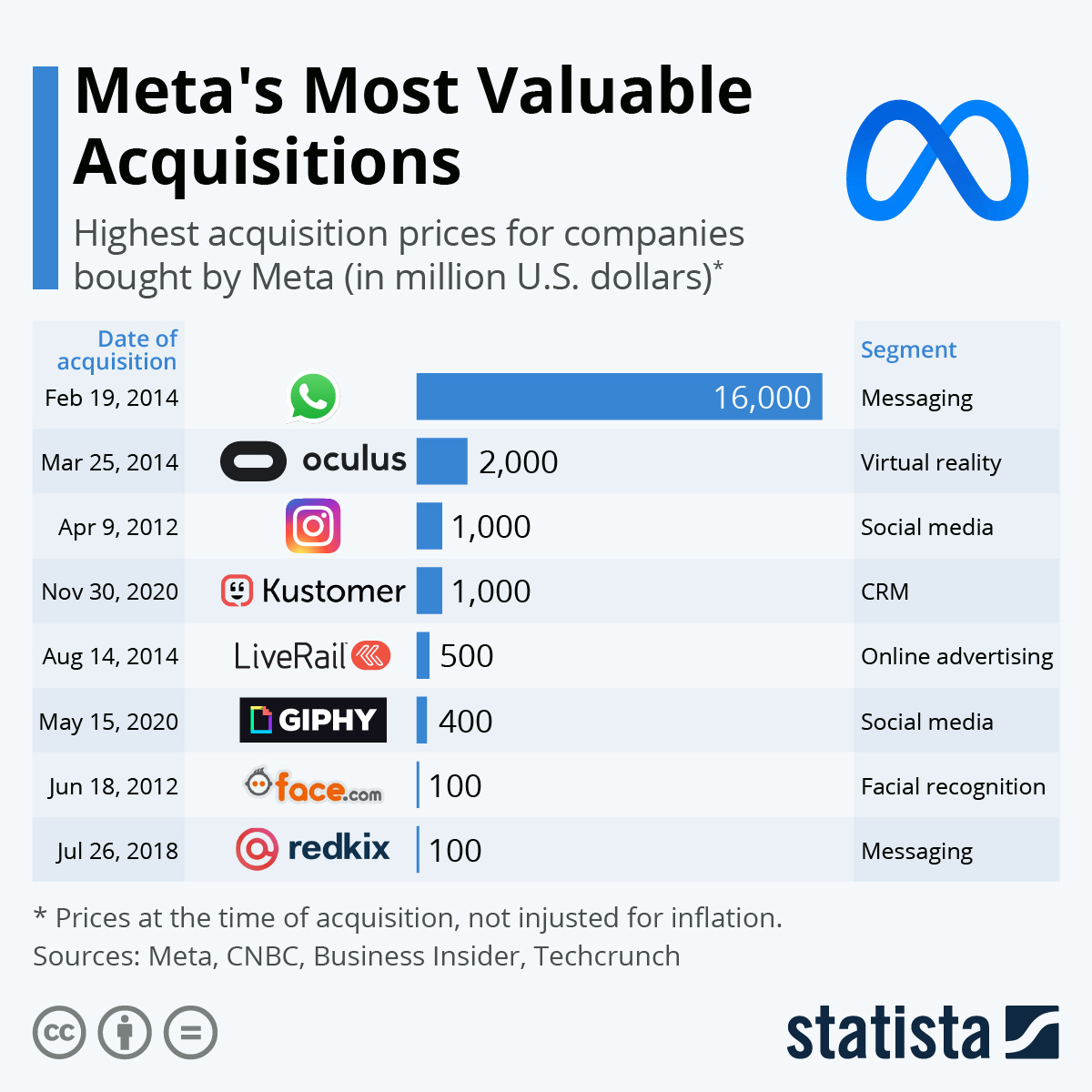Good morning investor 👋,
Welcome or welcome back to The Friday Filter—the quality investor’s market recap.
Meta made huge moves this week in the AI space, arguably overpaying by billions of dollars for a minority stake in a company called Scale AI. Mark Zuckerberg has always faced backlash for overpaying on acquisitions. I wanted to ask today: was this particular buyout another “mistake”? My answer: probably not (if it goes through). And I have data to back that point.
Today’s a short one.
Spotify stock analysis (paid) out this coming Wednesday; final post in my free How to Analyze Stocks Deep Dive series “Assessing Quality Compounders” out over the weekend.
Let’s get into it. (9 min read)
Today at a glance:
The Filter;
Meta always overpays. It’s worked (for them)
📄 In other news
📚 Resource of the week

Meta always overpays. It’s worked (for them)
The Filter
Over the past 10 years, Meta has spent ~$18 billion on acquisitions and stakes in other companies. About $15 billion of this total was spent this week after a 49% stake in Scale AI was announced for ~$15 billion.
While I don’t have any full details or verification on whether the deal will 100% go through, it was announced this week that Meta has officially bought this stake poaching the company’s CEO, Alexander Wang, in the process.
Why not a complete buyout, you may ask?
Personally, I blame antitrust, but I wouldn’t doubt if Meta made some backdoor agreement that gives them more operational control1.
Investors have always been wary of Meta and its many buyouts. There was something I read that mentioned how the WhatsApp acquisition was bought for 950x sales. Most of the company’s M&A history has included arguably overpriced acquisitions. I guess the question then is: why is this time any different? I mean, this time it’s an AI company (no Instagram that’s for sure)—low revenue, probably overvalued… checks the list of a Meta acquisition.
But still, what if paying for this low-revenue AI company that’s probably overvalued isn’t a bad thing?
Zuckerberg overpays, and it works out
Mark Zuckerberg always overpays for Meta’s buyouts and acquisitions, and it most times ends up working out well. Especially in a world like investing, that entire sentence sounds stupid, but history tells us this is one of the main reasons behind Meta’s dominance.
I recently came across a Twitter thread showing internal company emails between Zuckerberg and his team(s) during the early days of Meta’s biggest acquisitions. Turns out, before Meta bought Instagram and WhatsApp, and again when Snapchat was gaining popularity, Zuckerberg was consistently emailing ideas of whether they should buy them, or if it would help reinforce Facebook’s dominance, and so on. It says a lot about Zuck’s business style.
Instagram and WhatsApp specifically (that combined cost ~$20 billion) weren’t impulse buys. They were strategic bets on Meta’s growing ecosystem. When Zuckerberg saw something he thought would benefit the company, he tended to just scoop the company up—even if he overpaid. So while the end deals looked incredibly expensive on paper, those same deals ended up laying the groundwork for Meta’s scale, massive ad platform integration (making it one of the largest in the world), and data dominance to help it in training AI models currently.
Without the early absurd-at-the-time acquisitions like Instagram for $1 billion in 2012 (when it had 13 employees and basically no revenue at all), or WhatsApp for $19 billion in 2014 (similar to Instagram’s circumstances), and Oculus for $2 billion (which has had its small perks and many downsides, but I digress)—Meta wouldn’t be the company it is today.
Without Instagram, there goes ~$30–40 billion in FY 2025 projected ad revenue.
Without WhatsApp, there goes 2 billion+ users of Meta products.
It’s an interesting phenomenon.
These companies are so obviously successful, but as a consequence of these overpriced acquisitions—against all valuation models or rational use of capital. It’s absurd, dare I say a counterproductively successful strategy.
Without Facebook, would Instagram have reached its scale, or would it have been squashed by some other Facebook competitor product?
Who knows, but the master integration with Facebook and social media growth happening at the right time, is what made the buyout worth it. By itself, Instagram might not have achieved the scale it has today. (Very similar to YouTube and its Google-parent situation.)
Now, with Meta’s enormous scale, any further acquisitions integrate much faster into the ecosystem assuming they’re a good fit.
That’s where Scale AI comes in.
Ok, but why Scale AI?
Scale AI is a data infrastructure company that cleans and labels data for the purpose of training it more efficiently on AI. It specializes in curating, labelling, and structuring large datasets. In other words, it helps organize and clean up huge amounts of data so that AI systems can learn from it. I should have just started with this last definition, but hey.
Scale AI already has OpenAI, Microsoft, Meta (itself), and even the U.S. Department of Defense as clients. And its business is becoming very important for AI in an environment that’s getting more complex with time—and fast. Most companies need the service that Scale AI provides.
I tried to dig into market share, but data analytics and infrastructure get so niche (as I wrote in my Palantir analysis) that I’m not sure if any market share figures were accurate. However, just for reference, the global data annotation tools market (the niche Scale AI supposedly operates in (I haven’t been able to verify this to a T) is expected to be worth about ~$1.3 billion, and current revenue from Scale AI is about ~$760 million. Assuming these numbers are even remotely accurate, that gives us a market share of about ~60%.
Scale AI is a market leader by these estimates, if correct.
But the “market leading” business might not be the only reason for Meta to buy such a large peice of the company for so much. How about poaching this company’s CEO?

Scale AI’s CEO, Alexandr Wang, is still in his twenties. He’s the youngest self-made billionaire, but already one of the most important voices in American AI advancement. He’s briefed Pentagon officials, lobbied U.S. AI policy, and positioned Scale as a key player in American national affairs. For Zuckerberg, attaching Meta to Wang’s growing name and Scale AI’s growing importance makes a lot of sense—including when, like we saw with Instagram, Scale AI is a business that actually matters to Meta to benefit its future.
Alexandr Wang is set to stay on as director, but will give up his CEO position to join Meta to work on their superintelligence efforts. Chief Strategy Officer Jason Droege will become the new CEO.
“As you’ve probably gathered from recent news, opportunities of this magnitude often come at a cost,” Wang wrote in the memo that he shared on X. “In this instance, that cost is my departure. It has been the absolute greatest pleasure of my life to serve as your CEO.” — CNBC
If Meta wants to stay competitive in the race for AGI or superintelligence, this is the kind of investment that they should be making. And yet again, the Zuck Spends Money Formula repeats.
An investment of over ten billion dollars at a valuation of $30 billion for a company with relatively low revenue.
Overvalued? Probably. But again, that’s the pattern: Zuckerberg just about always pays big for what he believes will matter in five to ten years (when it comes to buyouts). I’m not a shareholder of Meta. I have no reason to be talking good about Mark Zuckerberg. But this deal is the largest pure AI acquisition deal I’ve seen since ChatGPT became widespread.
I’m still figuring out what all of this means for my holdings. I’ll be sure to let you know when I fully understand it, but until then, like history shows us, I don’t think this acquisition was a mistake. I think this is bullish for Meta.
Things will work out one way or another. I think.
a. 📄 In other news
Google offers buyouts for layoffs
This is company-wide (I’ve seen reports that only include Search layoffs, but that isn’t accurate; they’re happening in commerce, marketing, research, and more). It’s no mystery that AI is making big tech more operationally efficient. The applications are endless, so it doesn’t surprise me to see this type of move. Smart move to offer buyouts as well (a great PR move).
After a decade or so of ownership battles with Comcast and AT&T, Disney now owns 100% of Hulu. It’s not a surprise, but it’s exciting news. Disney has been planning a duty free Disney+, Hulu, and ESPN+ bundle for months, and now they can continue this with full integration.
Micron to invest $200 billion into U.S.
Continued semiconductor manufacturing investments into the U.S. Enough said, really; this is great news for all tech investors with concerns over Taiwan geopolitics. (I figure the U.S. will eventually become domestically self-sufficient in its advanced chip production over time. That’s bullish for everybody.)
Pretty mediocre announcements at the event. Decent updates on Phone (app) and iMessage, but minimal. I do like the new liquid glass design (controversial, but it looks cleaner), but it’s a consistent letdown that the revamped Siri update has been postponed to early 2026. Full video by MKBHD linked above.
b. 📚 Resource of the week
A Substack article I read this week.
It very much aligns with my investment philosophy of “Invert, always invert” and how I conduct all of my investment due diligence. (“Invert, always invert” is something I use a lot and it’s from Charlie Munger and I think Einstein.)
Biologically, every one of us is programmed to get things done, to solve the problem. But to get the same things done and to solve said problem, it’s often more effective and efficient to figure out how you would do the opposite.
Imagine you’re looking for ways to strengthen your investment thesis. One of the best ways to do so is to flip your logic.
I’m writing more about this topic (and others) in my final Deep Dive issue in the How to Analyze Stocks series, which I’m excited to have you all read. But since it won’t be out by the time this issue is sent, I wanted to share a post that still reflects my views in the meantime.
Would recommend giving this a read.
—-
Thanks for reading today. Hope to see you soon (only figuratively; I’m not spying on you, I swear). Cheerios, friend.
All of my links here.
From the archives:
My Palantir stock analysis (report, paid):
How to Analyze Stocks (part 2 in my free Deep Dive series):
Just my petty rumours. Big tech is usually sketchy like that.








